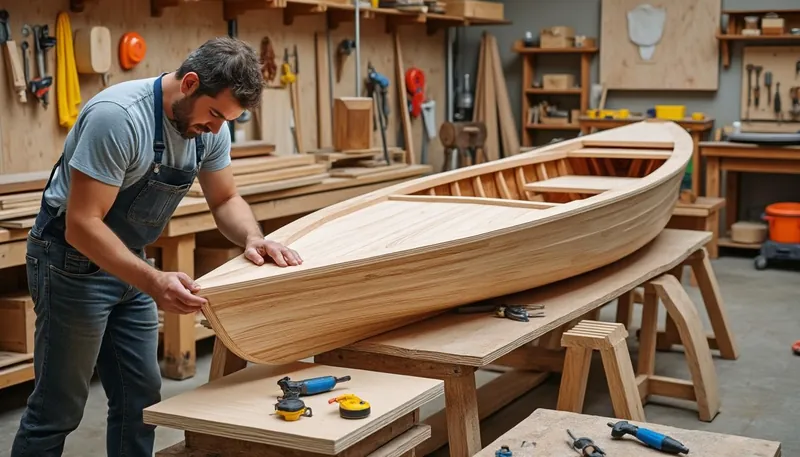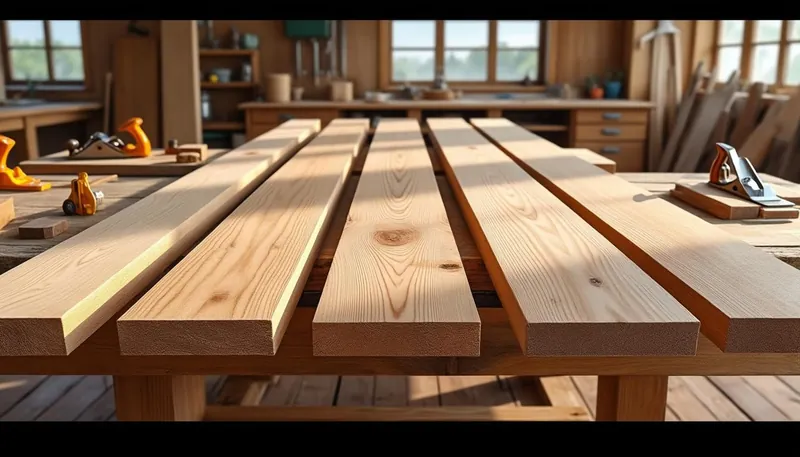Marine plywood is a go-to material in the wooden boat construction industry, known for its exceptional durability and water resistance. When thinking about building boats, it’s essential to understand why marine plywood stands out compared to regular plywood and what benefits it offers. This article takes a deep dive into various aspects of marine plywood, elaborating on its definitions, specifications, benefits, applications, and even industry standards, giving you a comprehensive overview of how it’s employed in boat building.
In Brief:
- Marine plywood is designed for aquatic applications, offering unparalleled durability. 🚤
- It’s made from thicker and more resilient veneers than standard plywood. 🌲
- Key wood types include Bruynzeel, Okoume, and Hydrotek. 🌍
- Its versatility sees it used in everything from hulls to cabin doors. 🛠️
- Industry standards like BS 1088 ensure quality and reliability. ✔️
Understanding Marine Plywood: Definition and Specifications
Marine plywood is a specialized grade of plywood crafted to withstand the harsh and wet environments frequently found in marine settings. But what’s the magic behind making it truly marine-grade? The composition and construction of marine plywood explain its unique properties. Unlike regular plywood, marine plywood has a much stronger resilience to water, thanks to its layered construction.
The manufacturing process of marine plywood involves stacking multiple layers of thick hardwood veneers. Each veneer is bonded together under high pressure to form a solid panel. Key to the construction process is ensuring that the adhesives used are waterproof and resistant to delamination. Typically, types of wood like Okoume and Meranti, known for their density and durability, are chosen specifically for marine applications.
Composition and Construction
Marine-grade plywood incorporates high-quality wood species like WISA, which is noted for its effectiveness against rot. The bonded layers, rather than being randomly placed, adhere to a strict pattern, providing a consistent material that can endure the rigors of marine environments.
| Wood Type | Density (g/cm³) | Moisture Content (%) | Application |
|---|---|---|---|
| Okoume | 0.6-0.8 | 6-8 | Hull Construction |
| Bruynzeel | 0.8-1.1 | 6-8 | Deck and Flooring |
| Sapele Marine | 0.5-0.7 | 6-9 | Cabin Doors |
Benefits of Marine Plywood in Boat Construction
Choosing marine plywood for boat construction comes with a plethora of benefits. One of the most significant advantages is its exceptional water and moisture resistance. Unlike regular plywood which can warp or rot due to excess water exposure, marine plywood’s unique properties ensure longevity and durability.
Low Maintenance and Versatility
Not only is marine plywood designed to resist moisture, but it also requires remarkably less maintenance. Imagine the convenience of owning a boat that doesn’t need constant repainting or sealing—that’s the allure of marine plywood! Plus, it can be used across various components, from hulls to furniture.
- 🌊 Resistance to water and moisture.
- 🛡️ Low maintenance requirements.
- 🔨 Versatile applications in boat construction.
- ✅ Enhanced durability against wear and tear.
Furthermore, marine plywood’s flexibility allows it to be bent effectively, making it ideal for crafting complex shapes needed in the hull design of boats and yachts.
Applications of Marine Plywood in Wooden Boat Construction
When it comes to practical applications in boat construction, marine plywood shines. Its versatility plays a key role in creating various components of boats. From hulls, superstructures, to even smaller fittings like furniture and doors, marine plywood is indispensable in the boating world.
Boat Hulls and Superstructures
One of the primary applications of marine plywood is in constructing boat hulls. The enhanced durability ensures that the boats remain structurally sound, even in the face of rigorous marine conditions. The challenges posed by water pressure and potential impacts make the choice of material vital.
| Component | Material Type | Function |
|---|---|---|
| Hull | Okoume | Base structure |
| Furniture | Hydrotek | Durable interior |
| Decking | Sapele Marine | Water-resistant flooring |
Decks and Cabin Elements
In addition to hull construction, marine plywood is also employed for decking and cabin doors. Especially for areas exposed to moisture, marine plywood ensures that the aesthetic remains intact while sustaining functionality. Imagine a beautifully designed deck accentuated with the strength of marine plywood—perfect for sunbathing or entertaining guests!
Industry Standards for Marine Plywood
While the quality of marine plywood is vital, adhering to industry standards is crucial for performance reliability. Many manufacturers seek certification to guarantee the quality of their marine plywood products. Understanding these industry standards can significantly guide your purchasing decisions.
BS 1088 and Other Certifications
The British standard BS 1088 is a key metric for assessing marine plywood. It outlines specific requirements for density, moisture content, and overall durability. Manufacturers like Roseburg and Pacific Maple ensure their products meet this rigorous standard, providing users with confidence in their purchase.
- 📜 BS 1088: Guidelines for moisture resistance.
- 🔍 Quality checks include testing for durability.
- 🤝 Certifications add credibility to manufacturers.
Companies that comply with standards gain customer trust and sustainability, making them top choices in the marine industry. Proper certifications not only guarantee quality but also demand adherence to environmentally friendly practices, a growing concern as we progress into future boat designs.
What is marine plywood used for?
Marine plywood is used for constructing boat hulls, decking, cabin doors, and furniture, ensuring water resistance and durability.
How is marine plywood different from regular plywood?
Marine plywood is made from high-quality veneers that are more moisture-resistant and durable than regular plywood.
What are the best types of wood for marine plywood?
Popular wood types include Okoume, Bruynzeel, and Meranti, known for their strength and resistance to decay.

